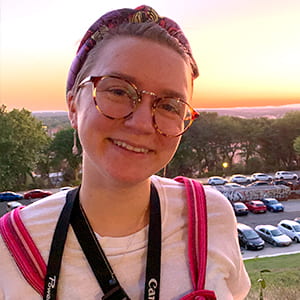Academic Paper: Roll for Performance: Dungeons and Dragons As Theater-Making
Artistic Project: Diamonds & Undeath
Public Event: A Friday Night Conversation about D&D and Theater
Friday, May 15th at 8pm (CST) — Zoom link here
 Biographical Statement
Biographical Statement
Molly Bridges is a graduating theater major at the University of Chicago, originally from Matthews, North Carolina. Most of their free time has been overtaken by this thesis, but they enjoy music, theater, and all types of games, but especially board games and tabletop RPGs. Life after college is very uncertain for Molly, but their biggest dream is to go to graduate school for education and teach high school theater. In their time at the College, they have been on several University Theater and TAPS productions, serving as an actor, a stage and production manager, and an assistant director.
Research Statement
“…since its resurgence in the 2010s with the release of fifth edition Dungeons and Dragons, D&D has evolved beyond a strategy-heavy, battle-centered game and become a more emotional, story-driven experience, allowing you to weave a highly customized fictional narrative with your friends and family. This narrative is, in fact, a form of theater centered in play. The stories you create in D&D, no matter how long-winded or non-linear they may be, are created through a process of experimentation and communication that highly resembles the dynamic you would find in a rehearsal room, whether for staging an existing play or developing an ensemble-based devised production.”
As a member of both the theater community and the D&D community, I have been repeatedly struck by their similarities in methodology. I have found both D&D and theater to be places of experimentation and discovery, with a strong focus on ensemble work and communication. As a result, my critical paper is a deep dive into the processes of creation in both spaces, using the popular actual-play web series Critical Role as a case study.
In my paper, I found that one of the greatest strengths in both theatrical and D&D spaces is the power of trusting your ensemble. In D&D, the ensemble is important because you are working as a team to build a compelling and personally important story basically from scratch; in theater, the same is true, but within the structure of a script. The way in which theater makers and D&D players communicate within their teams has a direct, extremely powerful effect on the type of story that gets told, from the structure of the narrative to the themes explored to the journeys of the characters along the way. My paper intends to highlight that level of connection, suggesting that because of the similarities in the way they function, D&D and theater may not be so out of place in each other’s spaces.
Artistic Statement
One of the things I didn’t get the time to discuss in my paper was the function of the audience. This was an intentional choice; after all, the vast majority of D&D games are only consumed by the people playing in the campaign. However, given the importance of the audience in theater, and especially given that my paper so closely followed the events of Critical Role, I still felt that the audience was something I wanted to devote more time to. So, for my artistic project, my driving question was, “What happens when you create and run a D&D campaign with the intention for it to be observed?” I assembled a party of four players, all of whom had acting experience, and with myself as the Dungeon Master, I set out to create a campaign setting and run a two-session campaign, with the finale being posted to YouTube.
As an avid consumer of a variety of actual-play D&D shows, I had a pretty good gut feeling for what made a D&D game fun to watch. One of the things I discovered along the way, however, was that some of my favorite parts of playing the game were some of the most grueling things to watch. For example, I absolutely adore the rules- and math-heavy side of combat (rolling damage, determining the turn order, etc.), and I especially love it when battles are drawn out and hard-won. However, when I’m watching actual-play shows, I find myself constantly distracted in combat because it’s so much less active to listen to than it is to play through. Building a campaign became a sort of balancing act, trying to settle on a compromise between things we would like as players and things to hold the audience’s attention. For a first attempt (and a first time truly running a D&D campaign), I’m extremely proud of the story we created. I think playing D&D with the audience in mind taught me lot from a creator’s standpoint about how the audience can shape the way a story is told.
Lastly, because I love talking about D&D and theater so much, as a culmination of all of the work that has been done on this thesis, I am moderating a live discussion about the relationship between D&D and theater. This idea was born mostly out of the excitement of my fellow colloq members any time I would talk about my progress in my paper. There were so many topics within the world of D&D that I badly wanted to discuss in my paper, but didn’t get the chance to, so I am hoping that those conversations will find a home here.
Artistic Project – Diamonds & Undeath
